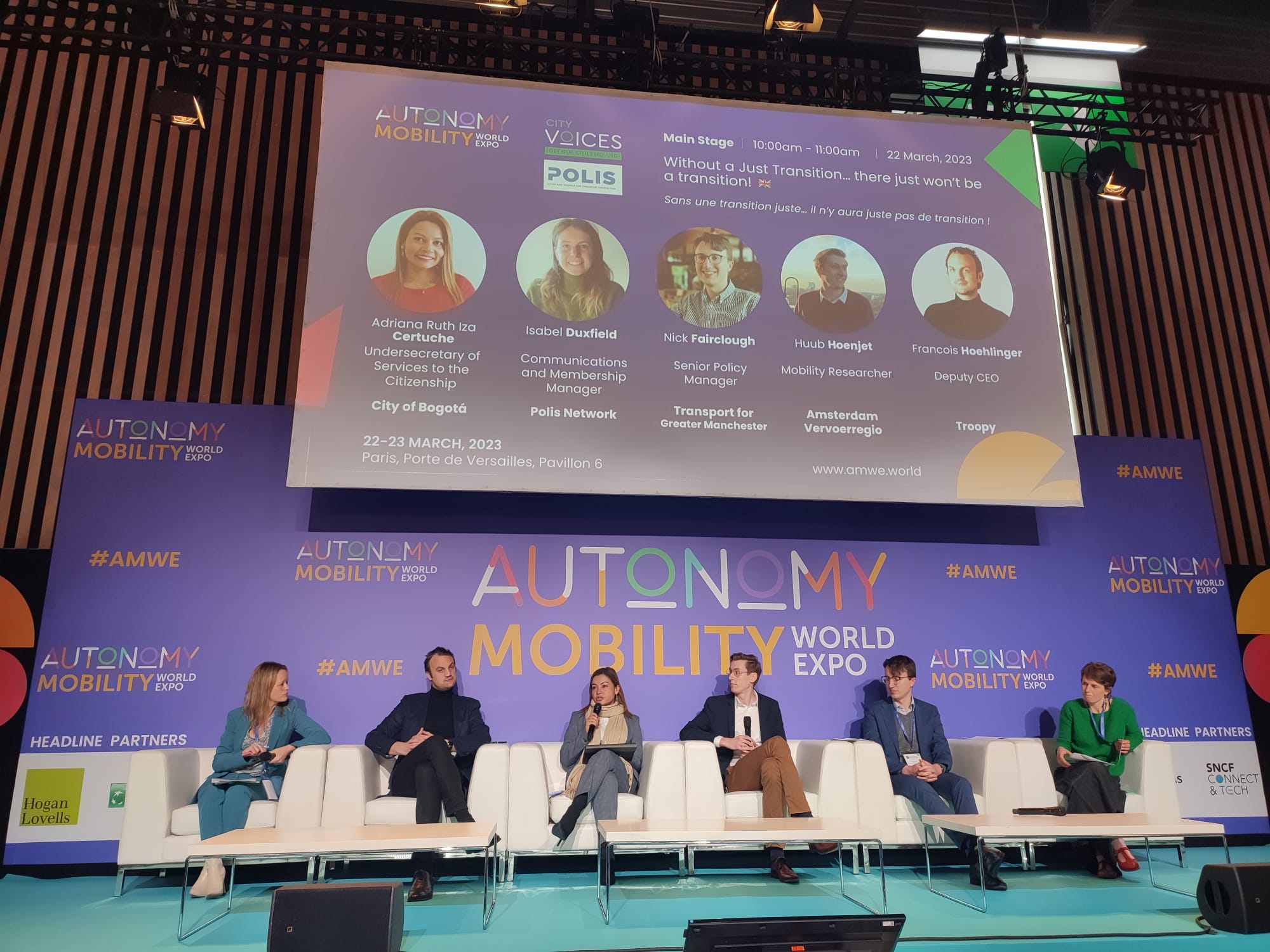POLIS elevates the voices of cities at Autonomy Paris
On 22 and 23 March, POLIS joined forces with Autonomy Mobility World Expo for the 5th edition of City Voices – Get our Cities Moving, a series of panel discussions placing the experiences, opinions and aspirations of our cities at the forefront of international debates on mobility, while engaging in a dialogue with the industry. The Autonomy Mobility World Expo convenes industry leaders, policymakers, and other stakeholders from across the sector.
Ensuring a Just Transition, scaling up electromobility, managing micromobility, and managing urban space, were top of the agenda. Across four unique panel discussions, POLIS, member cities and key industry leaders sat down to debate the leading issues shaping the face of urban mobility, and the future of public-private cooperation.
From Greece to The Netherlands, Sweden to Spain, and Hungary to France, it was a truly international, cross-sector dialogue on a spectrum of pivotal, urgent, and sometimes thorny, challenges facing urban mobility.
Set against the backdrop of the IPCCs’ latest damning report on the climate emergency facing not just Europe, but the globe.
“These clear, comprehensive cross-sector discussions have never been so critical to jointly tackle the urban mobility challenges we face and cooperate on common solutions,” said Karen Vancluysen, POLIS Secretary General, opening the City Voices session.
As representatives from the trade and public sectors joined Autonomy, the race towards cleaner and smarter mobility were clearly underway.
Without a Just Transition… there just won’t be a transition!’
City Voices kicked off with a panel examining how exactly we move from acknowledging the changes required for our mobility systems to become more inclusive, to clear standards and actions, and how we can better formulate our language around vulnerability.
This is a topic POLIS has been working on widely, following the publication of its “Just Transition Agenda” and the recent launch of its Just Transition Webinar Series. The network shared the stage with Manchester, Amsterdam, Bogota and industry partner Troopy.
“Clearly, catering for ‘all needs’ is a tough task, and there are many who will say, “we cannot satisfy everyone”. Now, this may be true, but this is not the situation we are facing,” said Isobel Duxfield, POLIS Communications Manager.
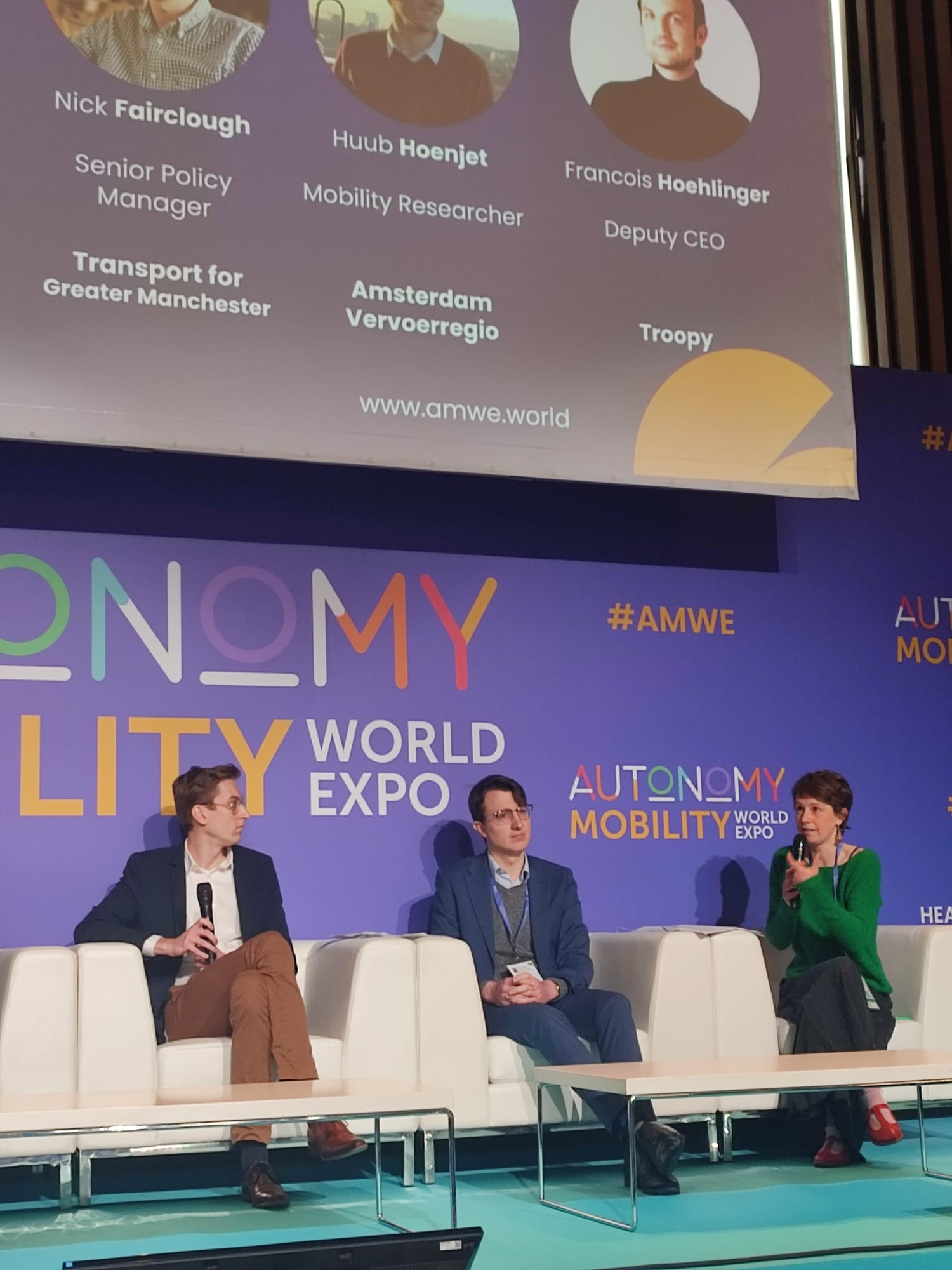 “Accessibility and inclusion are often seen as accommodating the needs of “fringe” or “vulnerable” users or user groups. Yet, from the inaccessible design of electric charging to high costs of public transport, and the prevalence of gender-based violence in public space; failure to place transport justice front and centre are locking huge swathes of the population out of sustainable mobility options.”
“Accessibility and inclusion are often seen as accommodating the needs of “fringe” or “vulnerable” users or user groups. Yet, from the inaccessible design of electric charging to high costs of public transport, and the prevalence of gender-based violence in public space; failure to place transport justice front and centre are locking huge swathes of the population out of sustainable mobility options.”
Transport for Greater Manchester is seeking to tackle gender-based violence at the root, developing courses on behavioural change. Faced with the cost-of-living crisis, the city is also addressing the affordability of public transport, by implementing price caps.
“We are putting affordability of public transport front and centre in our approach. We know that given the rising cost of living, transport needs to be affordable not just for its own sake, but to enable people to access all forms of social and economic life,” said Nick Fairclough, Transport for Greater Manchester.
Huub Hoenjet from Amsterdam Vervoerregio shared how the metropolitan region is rapidly adopting a more comprehensive approach to accessibility, underpinned by data-driven mapping of public space and public transit, identifying their gaps and opportunities for targeted intervention.
Managing Micromobility
Shared micromobility continues to be a hot topic. For many cities, it has been more of a ‘hot potato’, as the ‘invasion’ of e-scooters and e-bikes triggered a public outcry, inflamed debates in the media and put mayors, deputy mayors, and transportation officials on the spot. Indeed, as panellists sat down in Paris, the city readied itself for a referendum on e-scooter deployment.
“We need a constructive framework to stimulate strategic dialogue and cooperation among all parties – that’s the only way of shaping win-win solutions,” said Pedro Homem de Gouveia, Senior manager at POLIS.
Laszlo Kerenyi from POLIS member BKK Budapest joined the city of Torino, as well as Karima Delli, the European Parliament’s Transport & Tourism Committee Chair, and Nicolas Gorse from micromobility operator Dott for a truly cross-sector discussion, ironing out some tricky but important issues.
“Regulating scooters is a challenging task at the local level, but a key tool is the reallocation of space, so that micro and shared mobility, as well as other forms of active travel, have more space,” said Lazlo Kerenyi, BKK.
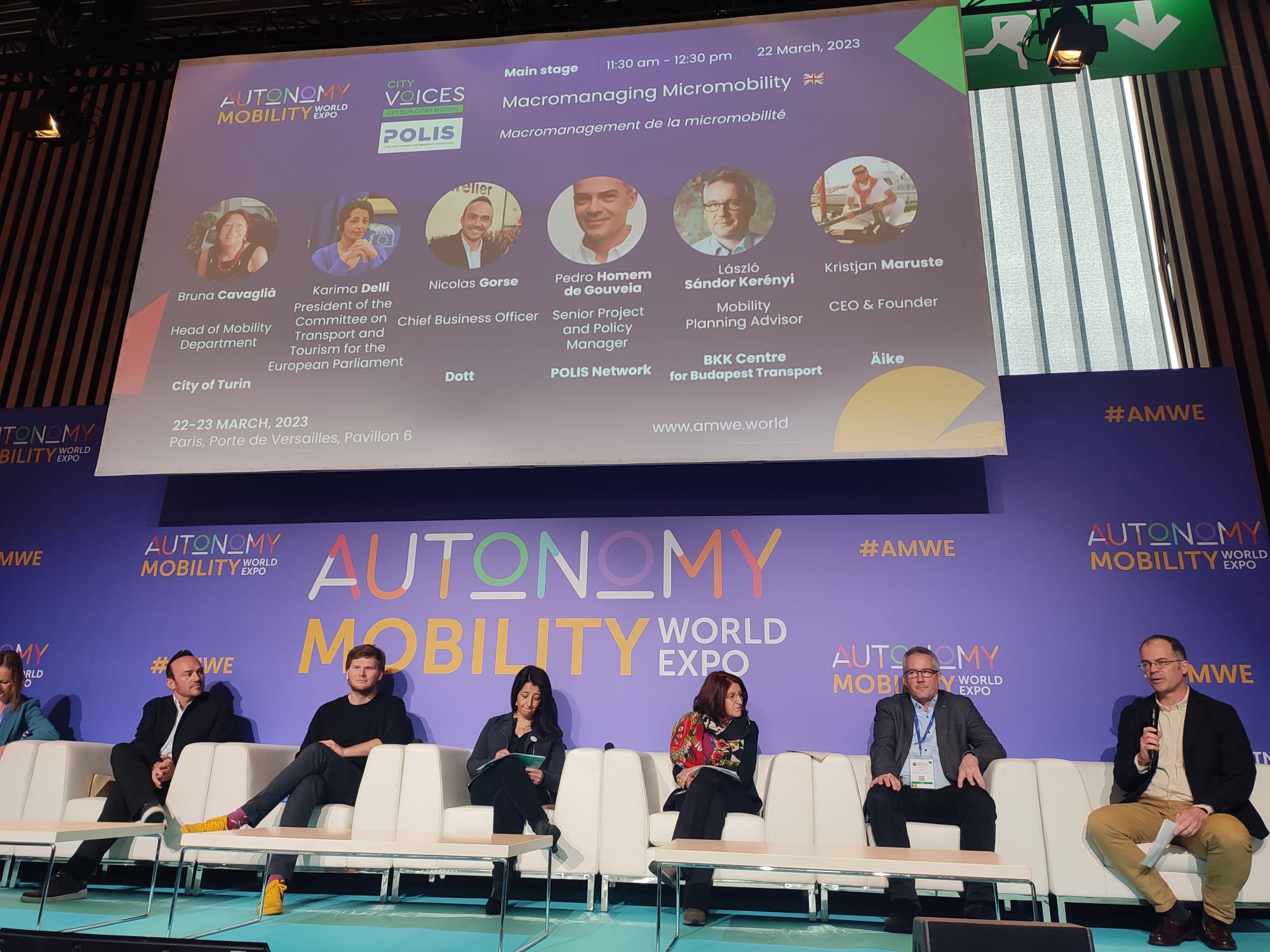
In or out? Managing access to city streets, public space and the curbside
Space in cities is scarce and valuable. The good news is that cities are in charge of public space and can use it as a very powerful tool to prioritise or de-prioritise modes in urban cores, whether it is through the reallocation of space, by putting a price on it, or by dynamically attributing different functions to it.
However, key questions remain. How will the space race reshape our cities in the future? What innovative access regulations, circulation plans, urban space design approaches and ‘last meter’ solutions are leading cities rolling out? What digital support tools are out there and in the pipeline that can support this transition?
Terry Albronda; Matthieu Graindorge and Michelle Coldrey from POLIS members Groningen, Helmond and Gothenburg joined the International Transport Forum’s Phillipe Crist and Grégoire Heugel from Michelin for a debate on what cities are - and should be – doing and which solutions are within reach.
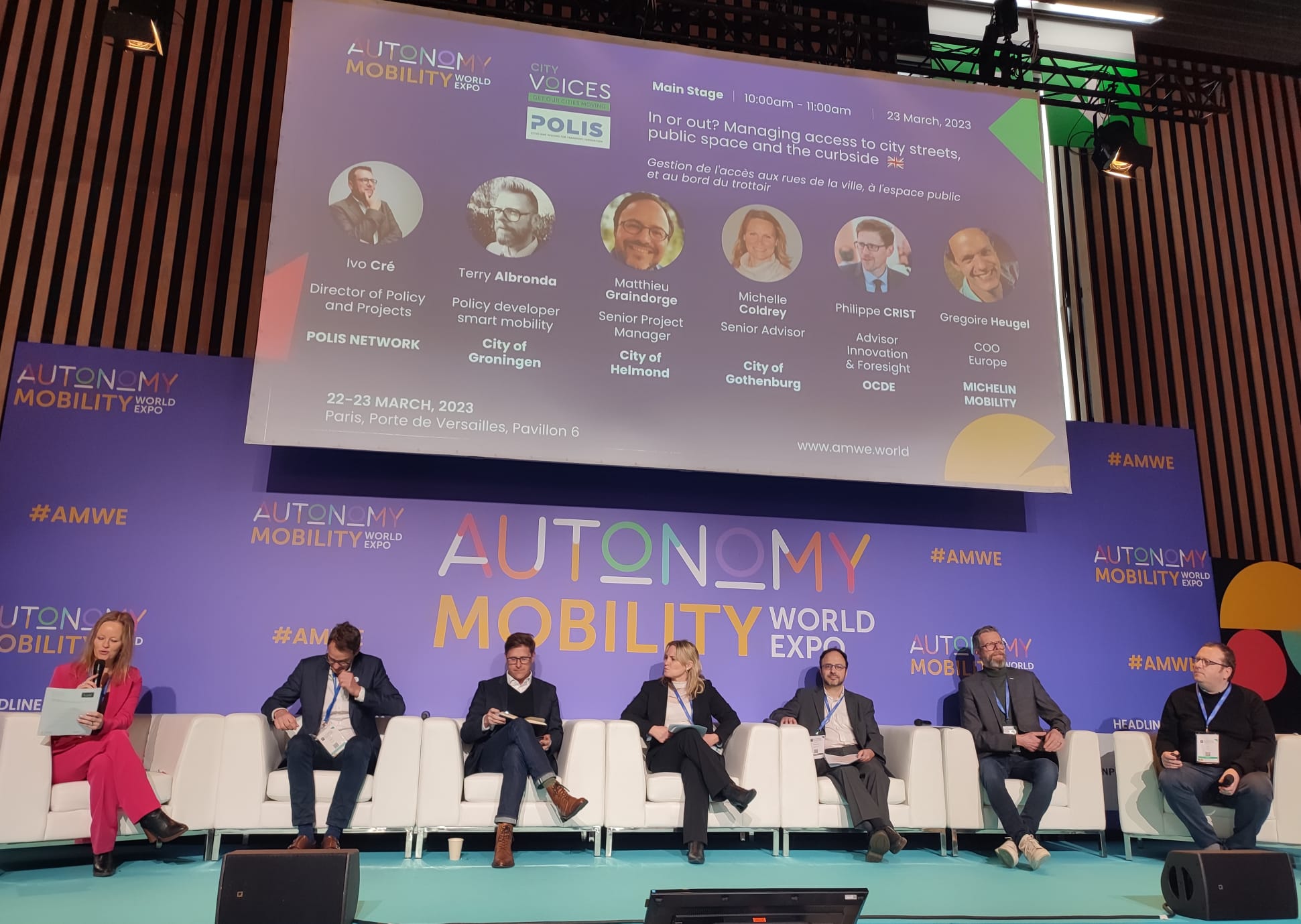
“Technologies are changing and developing rapidly, but a lot of the activity happening on the ground is not necessarily digital,” said Philippe Crist, International Transport Forum.
This was echoed by the cities on the panel, who also noted the importance of non-digitalised actions.
“We are doing a lot to enable multi-use of space, but to ensure the technologies work, you need to get the basics right!” asserted Terry Albronda, Groningen.
Indeed, this has been the approach taken by Gothenburg. Having introduced their congestion charge in 2013, they are still seeking to tackle congestion and carbon emissions from traffic.
The key takeaway from the panel- made up of larger and smaller cities- was the need for interconnectivity between technologies, physical spatial intervention and citizen participation. This was evident from Helmond’s experience in the ReVeAL project (Regulating Vehicle Access for Improved Liveability) where cities, large and small have experimented with a range of UVARs (Urban Vehicle Access Regulations), through innovative spatial interventions such as Low Emissions Zones (LEZs), Congestion Charges, Limited Traffic Zones (LTZs)- which combine digital and physical tools.
Scaled Electromobility: What’s new? What’s next?
Cities play an important role in the making (or breaking) of electromobility in Europe. Yet they face a series of critical challenges in the process.
“Cities need to make future-proof investments and have to understand the latest developments in the EV market, which includes a growing number and diversity of small electric vehicles popping up, from e-bikes and e-scooters to e-skates and more,” asserted Pedro Gomes, Project Manager at POLIS.
To examine what this looks like on the ground, POLIS members Ioannis Toskas from Thessaloniki Transport Authority, Sergio Fernandez from EMT Madrid, Tim Asperges from Leuven and Françoise Guaspare from Ile-de-France joined ChargePoint and FIER from the sector for a comprehensive and honest dialogue.
“EMT Madrid is doing an ambitious renovation effort of its fleet and became the first major European city with a 100% clean bus fleet,” noted Sergio Fernandez Balaguer, EMT Madrid.
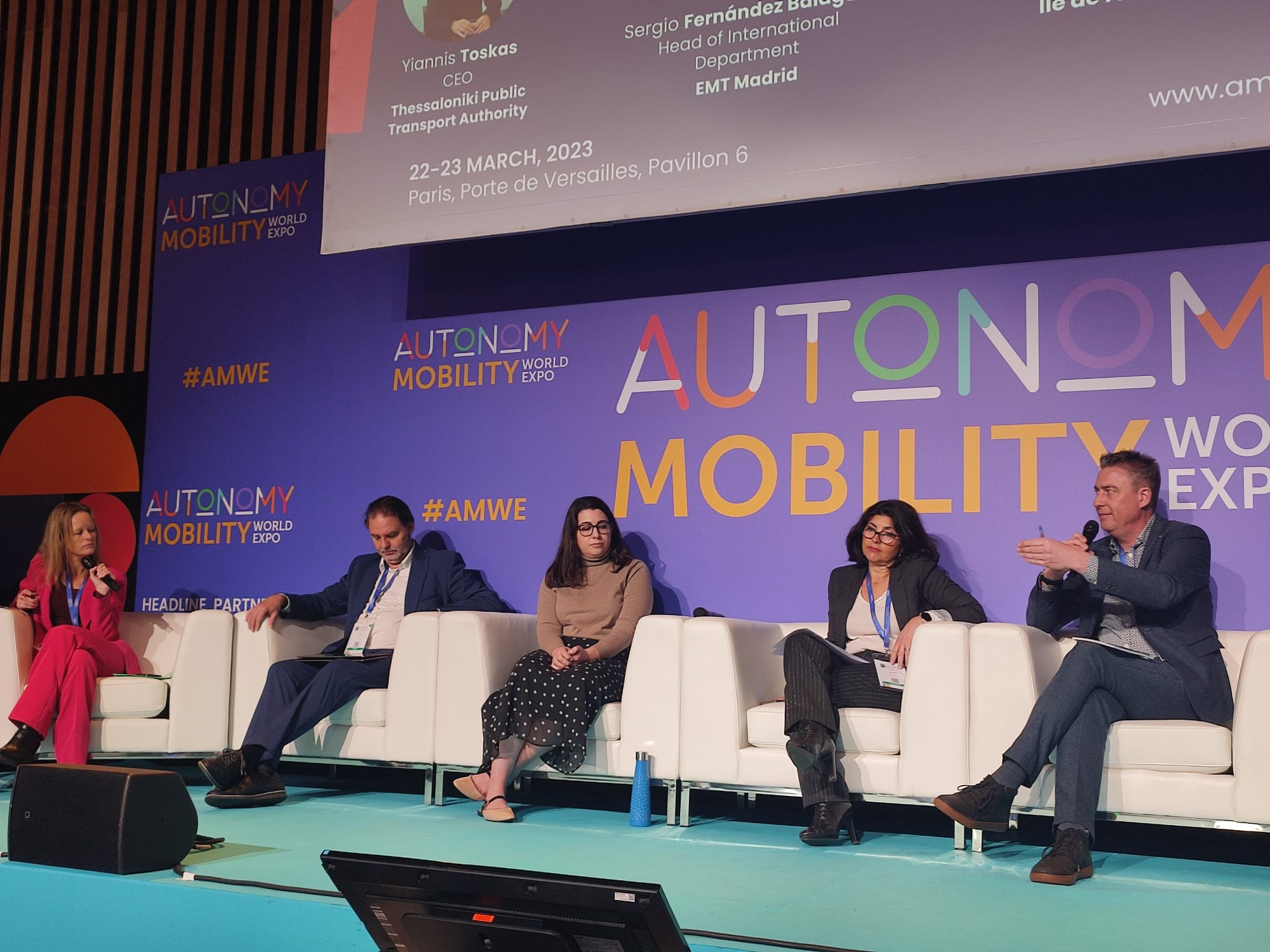
Yet, the need for cooperation between cities emerged distinctly.
“It’s important for cities to cluster and promote joint public procurement of EV charging infrastructure, instead of each one doing its process. Leuven is cooperating with other Municipalities from the Flemish Region on tendering processes for EV charging infrastructure,” said Tim Asperges, Leuven.
Yet, this also requires support from international actors.
“Regions need clear guidance and a stable policy framework from the EU, to accelerate the rollout of electric fleets,” noted Francoise Guaspare, Ile de France.
At the same time, public-private cooperation appeared key.
“We must not call this a “chicken and egg” issue, but a “hamburger and bun” as both need to be happening at the same time,” said Anne Smart, ChargePoint, referring to the roll-out of charging infrastructure in parallel with the increased deployment of electric vehicles.
Missed the panels and want to hear the full discussion? You can watch the sessions on the links below:
- Without a Just Transition… there just won’t be a transition!
- Macromanaging Micromobility
- In or out? Managing access to city streets, public space, and the curbside
- Scaled Electromobility: What’s new? What’s next?
